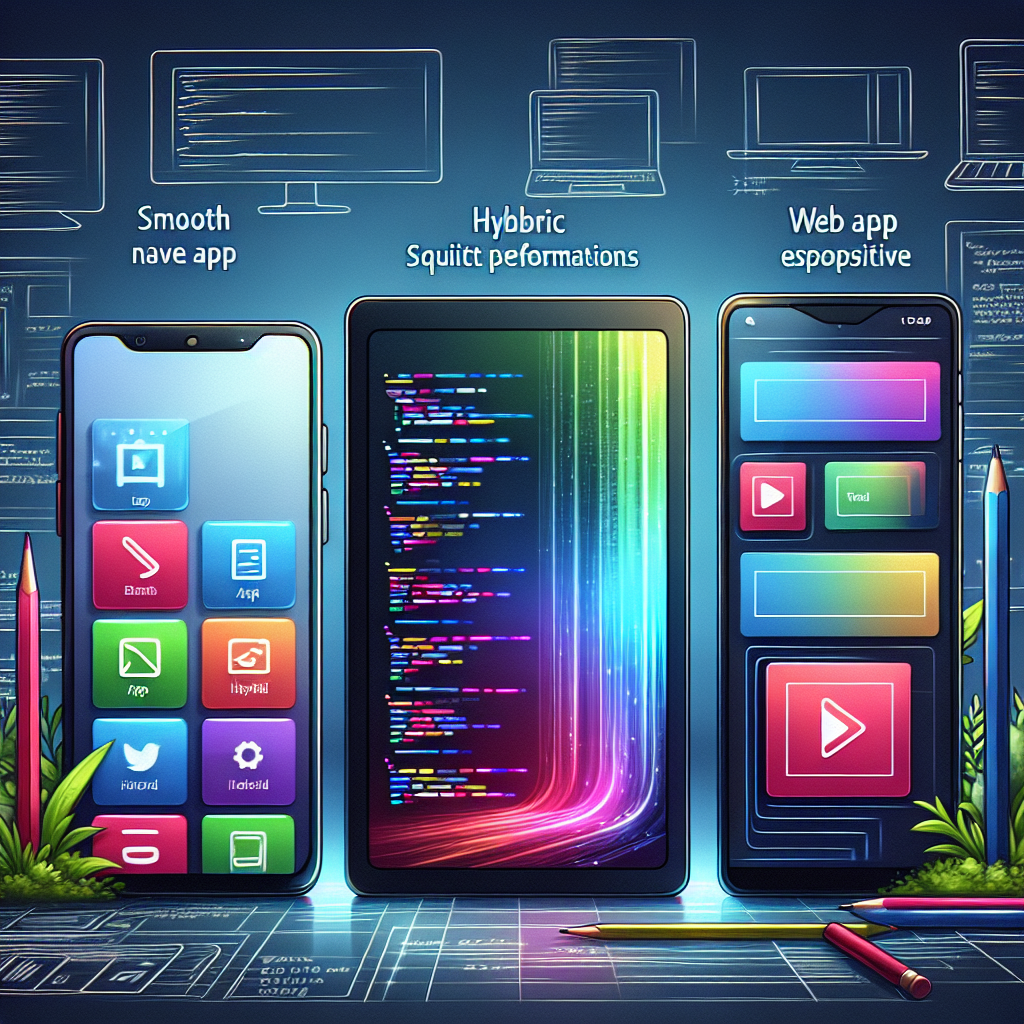In today’s competitive market, understanding the mobile app type scale is crucial for developers aiming to create impactful applications. The type scale categorizes mobile apps into various types, such as native, hybrid, and web apps, each serving distinct purposes and user needs. By recognizing these categories, developers can make informed decisions that align with their project goals.
Choosing the right app type significantly influences user experience and engagement. For instance, native apps offer superior performance and are tailored for specific platforms, making them ideal for applications requiring high-speed processing and seamless integration with device features. On the other hand, hybrid apps combine the best of both worlds, allowing developers to write a single codebase that runs across multiple platforms, thus saving time and resources.
Moreover, understanding the mobile app type scale aids in strategic marketing planning. It enables developers to identify target audiences effectively and implement user acquisition strategies tailored to the app type. This knowledge can lead to better app visibility and higher download rates.
Therefore, to navigate through the complexities of app development and ensure your application stands out, Book A Consultation Now! here to gain insights from our experts at App Wise Consultings.
Different Categories of Mobile App Types
Mobile applications can be broadly classified into several categories, each tailored to meet specific user needs and functionality. Understanding these categories is essential for developers to choose the right approach for their projects.
- Native Apps: These apps are built for specific platforms, such as iOS or Android, using platform-specific programming languages like Swift or Kotlin. They provide optimal performance and a seamless user experience, leveraging device features like GPS, camera, and push notifications.
- Hybrid Apps: Hybrid apps are a combination of native and web applications. They are developed using web technologies (HTML, CSS, JavaScript) and wrapped in a native shell, allowing them to run on multiple platforms. This approach offers cost-effectiveness and faster development times.
- Web Apps: Unlike native apps, web apps run in a web browser and are accessible through the internet. They are built using standard web technologies and do not require installation. While they are easier to develop and maintain, web apps may not provide the same level of performance and user experience as native or hybrid apps.
- Progressive Web Apps (PWAs): PWAs are a newer category that combines the best features of web and mobile apps. They offer offline capabilities, push notifications, and can be installed on a user’s device directly from the browser, providing a native-like experience without the need for app stores.
Each category has its advantages and disadvantages, and the right choice depends on various factors such as target audience, budget, and specific app requirements. By understanding these different types, developers can make informed decisions that enhance the overall success of their mobile applications.
Factors Influencing Mobile App Type Selection

Selecting the appropriate mobile app type is a critical decision that can significantly impact the success of your application. Several factors come into play when making this choice, each influencing both development and user experience.
- Target Audience: Understanding the demographics and preferences of your target audience is vital. For example, if your users predominantly use iOS devices, creating a native app for that platform may enhance user satisfaction and engagement.
- Budget: The development cost is a significant factor. Native apps usually require more investment due to the need for separate development for each platform. In contrast, hybrid and web apps can be more budget-friendly, allowing for a quicker return on investment.
- Functionality: The features and functionalities you plan to incorporate can also determine the app type. If your app requires access to device hardware like the camera or GPS, a native app may be the best choice. On the other hand, if your app primarily focuses on content delivery, a web app could suffice.
- Time to Market: If you need to launch your app quickly, hybrid or web apps may be the way to go. They typically offer faster development cycles compared to native apps. However, consider that speed should not compromise quality and user experience.
- Maintenance and Updates: The ease of maintaining and updating your app should be considered. Native apps may require separate updates for each platform, whereas hybrid and web apps can be updated centrally, simplifying the maintenance process.
Each of these factors plays a crucial role in the decision-making process. By carefully weighing them against your project goals, you can select a mobile app type that not only meets user expectations but also aligns with your business objectives.
Benefits of Choosing the Right Mobile App Type

Making an informed choice regarding the type of mobile app can yield significant advantages, directly influencing the app’s success and user satisfaction. Here are some key benefits of selecting the right mobile app type:
- Enhanced User Experience: Choosing the appropriate app type allows for a more tailored user experience. Native apps, for instance, offer smoother performance and faster load times, which can lead to higher user retention.
- Improved Performance: Native applications leverage the full capabilities of the device’s hardware and software, resulting in superior performance. This can be especially crucial for apps that require intensive graphics or real-time data processing.
- Broader Reach: By selecting an app type that caters to your target audience‘s preferences, you can increase your app’s visibility and engagement. For example, a hybrid app can work across multiple platforms, allowing you to reach users on both iOS and Android without duplicating efforts.
- Cost-Effectiveness: The right mobile app type can help optimize your development budget. For projects with limited resources, hybrid or web apps can offer a cost-effective solution without sacrificing essential features, making them ideal for startups or small businesses.
- Ease of Updates: Choosing a mobile app type that simplifies maintenance and updates is essential for long-term success. Web apps allow for quick updates without requiring users to download new versions, ensuring that your audience always has access to the latest features.
In summary, selecting the right mobile app type is not just about technical considerations; it profoundly impacts user experience, performance, and overall business success. By understanding the benefits associated with each type, developers can make strategic decisions that foster growth and user loyalty.
Best Practices for Mobile App Development

Implementing best practices in mobile app development is essential for ensuring quality, efficiency, and user satisfaction. Here are some crucial practices to consider throughout the development process:
- Define Your Goals: Before initiating development, clearly outline your app’s objectives and target audience. Understanding what problem your app solves and who it serves will guide your design and functionality decisions.
- User-Centered Design: Prioritize user experience by adopting a user-centered design approach. Conduct user research and testing to gather feedback, ensuring that the app is intuitive and meets user needs.
- Agile Development: Embrace agile methodologies to foster flexibility and collaboration among your development team. This iterative approach allows for quicker adjustments based on user feedback and changing market demands.
- Optimize for Performance: Focus on performance optimization from the beginning. Minimize loading times, reduce app size, and ensure smooth navigation to enhance user satisfaction and retention.
- Regular Testing: Implement continuous testing throughout the development lifecycle. This includes unit tests, integration tests, and user acceptance testing to identify and address issues early in the process.
- Plan for Scalability: Ensure that your app architecture can accommodate growth. Design your app to handle increased user traffic and additional features without compromising performance.
- Maintain Security: Protect user data by integrating security measures from the outset. Utilize encryption, secure authentication, and regular updates to safeguard sensitive information.
By adhering to these best practices, developers can create robust, user-friendly mobile applications that not only meet market demands but also stand out in a competitive landscape. Fostering a culture of quality and continuous improvement will lead to the long-term success of your mobile app.
Conclusion on Mobile App Type Scale for Developers

In summary, understanding the mobile app type scale is pivotal for developers seeking to create successful applications that resonate with users. By carefully selecting the appropriate app type—be it native, hybrid, or web-based—developers can significantly enhance user experience and ensure that the application meets the specific needs of its target audience. Each app type offers distinct advantages and challenges, and aligning these with your project goals will pave the way for a more streamlined development process.
Moreover, by following best practices in mobile app development, such as defining clear objectives, optimizing for performance, and prioritizing user-centered design, developers can create apps that not only function well but also engage users effectively. The right app type, coupled with a robust development strategy, ultimately contributes to the app’s overall success in a competitive market.
If you’re ready to take the next step in your mobile app journey and need expert guidance in choosing the right app type for your project, Book A Consultation Now! with us at App Wise Consultings. Our team is here to assist you in navigating the intricacies of mobile application development!
